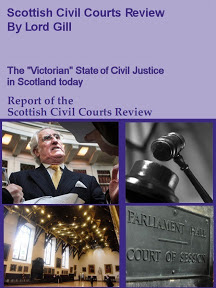 Scotland’s Lord Justice Clerk, Lord Gill’s reform proposals helped bring McKenzie Friends to Scots Courts system. THE FINAL CHAPTER in the long running campaign to bring McKenzie Friends to all of Scotland’s courts, which began with the consideration of the issue in 2007 by Lord Gill’s Civil Courts Review, has now finally been written, as the Sheriff Court Rules Council announced this week it had finalised its consideration of rules on the use of McKenzie Friends across Scotland’s Sheriff Courts, with enactment allowing unrepresented party litigants to apply to use a lay assistant expected within a matter of weeks.
Scotland’s Lord Justice Clerk, Lord Gill’s reform proposals helped bring McKenzie Friends to Scots Courts system. THE FINAL CHAPTER in the long running campaign to bring McKenzie Friends to all of Scotland’s courts, which began with the consideration of the issue in 2007 by Lord Gill’s Civil Courts Review, has now finally been written, as the Sheriff Court Rules Council announced this week it had finalised its consideration of rules on the use of McKenzie Friends across Scotland’s Sheriff Courts, with enactment allowing unrepresented party litigants to apply to use a lay assistant expected within a matter of weeks.
A spokesperson for the Sheriff Court Rules Council stated : “The Sheriff Court Rules Council further considered draft rules for the use of a McKenzie Friend at its meeting on 5 November. The Council agreed the substance of these and they will be submitted to the Court of Session for consideration later this month.”
The Scottish Parliament have also been briefed by the Sheriff Court Rules Council, who wrote to MSPs stating : “Current plans are for rule changes to be included within a miscellaneous instrument to be made later this month, but this of course depends on (a) when the Council’s proposed rules are finalised: and (b) the view taken of them by the Court of Session.”
However, further investigations & enquiries by Diary of Injustice have now established the original suggestion by the Sheriff Court Rules Council that McKenzie Friends be allowed to receive some form of payment for their services in the Sheriff Courts, has now been abandoned, and a similar set of rules forbidding the remuneration of McKenzie Friends, as was passed in the Lord Hamilton’s Act of Sederunt announced earlier in February of this year, which approved the use without remuneration of McKenzie Friends in the Court of Session in mid June 2010, will now also be used in the Sheriff Courts. I reported more on the remuneration issue during July, here : Lord President softens rules on Scottish McKenzie Friends, remuneration issue still out of step with England & Wales
A spokesperson for the Sheriff Court Rules Council answered enquiries on the remuneration point, saying : “The Council proposes that a similar provision in relation to the matter of expenses as to that which is already in place in the Court of Session Rules should be provided for in the sheriff court rules.”
A legal insider commented this was a rather unusual step, given there was already case law in England & Wales [N (A Child) [2009] EWHC 2096 (Fam)] to support the right or entitlement of a McKenzie Friend to charge or at least receive some form of remuneration for their services.
He said : “Personally I feel we could have done without this fuss over a McKenzie Friend being able to charge a fee or not. Forbidding it sounds almost anti competitive, and will at any rate, restrict the numbers of qualified individuals offering themselves up as McKenzie Friends. It is a counter productive attitude, and perhaps one which could be challenged later on under ECHR, with it possibly being open to interpretation of denying a party litigant the right to a fair hearing – if they cannot secure a qualified McKenzie Friend because of such a restriction.”
 Law Society of Scotland now support a presumed right for party litigants to use a McKenzie Friend in Scotland’s courts. Meanwhile the Law Society of Scotland followed suit, its Civil Justice Committee stating “…there should be an automatic right to use a McKenzie Friend. However, it should be within the court’s discretion to insist on a withdrawal of a McKenzie Friend if it determines that the position is being abused.” which sets out an almost identical position to that of McKenzie Friends in England & Wales.
Law Society of Scotland now support a presumed right for party litigants to use a McKenzie Friend in Scotland’s courts. Meanwhile the Law Society of Scotland followed suit, its Civil Justice Committee stating “…there should be an automatic right to use a McKenzie Friend. However, it should be within the court’s discretion to insist on a withdrawal of a McKenzie Friend if it determines that the position is being abused.” which sets out an almost identical position to that of McKenzie Friends in England & Wales.
An official from one of Scotland’s consumer organisations who have consistently spoken in favour of McKenzie Friends commented on the Sheriff Court Rules Council announcement, welcoming the changes. He said : “I view this as a positive step in ensuring many consumers in Scotland who for various reasons do not have access to a solicitor can now enjoy a significant measure of assistance to help them as party litigants present their case in the Sheriff Courts.”
He continued : “The Civil Courts Review team and Lord Gill are to be commended for pursuing the question of McKenzie Friends in their two year investigation of civil justice in Scotland. I would also like to say the Scottish Parliament’s scrutiny of the issue also played a part in ensuring its speedy implementation.”
 2007 Civil Courts Review consultation raised McKenzie Friends issue. The question of McKenzie Friends was first raised in the 2007 Civil Courts Review Consultation Paper (pdf) launched by Scotland’s Lord Justice Clerk, Lord Gill to being the Civil Courts Review. In the paper, Lord Gill stated : “The courts in England and Wales have for over 30 years allowed party litigants to be assisted in court by what have become to be known as “McKenzie friends”. They do not take on the role of a lawyer, but provide support in court such as making notes, prompting or giving advice on the conduct of the case. There have been occasions where the Court has gone further and, in particular circumstances, allowed the McKenzie friend to address the Court.148 In such cases the court has to exercise its statutory powers and grant a right of audience to the McKenzie friend. The desirability of permitting a party litigant to be represented in court by a person without a right of audience is a matter that the Review will consider.”
2007 Civil Courts Review consultation raised McKenzie Friends issue. The question of McKenzie Friends was first raised in the 2007 Civil Courts Review Consultation Paper (pdf) launched by Scotland’s Lord Justice Clerk, Lord Gill to being the Civil Courts Review. In the paper, Lord Gill stated : “The courts in England and Wales have for over 30 years allowed party litigants to be assisted in court by what have become to be known as “McKenzie friends”. They do not take on the role of a lawyer, but provide support in court such as making notes, prompting or giving advice on the conduct of the case. There have been occasions where the Court has gone further and, in particular circumstances, allowed the McKenzie friend to address the Court.148 In such cases the court has to exercise its statutory powers and grant a right of audience to the McKenzie friend. The desirability of permitting a party litigant to be represented in court by a person without a right of audience is a matter that the Review will consider.”
 Consumer Focus Scotland have supported the idea of McKenzie Friends in Scottish courts for years. The Scottish Consumer Council (now renamed Consumer Focus Scotland) responded to the consultation paper in March 2008, over a year before a petition was filed at the Scottish Parliament on the issue, backing the call to introduce McKenzie Friends. The Scottish Consumer Council’s response stated : “We would welcome recognition by the Scottish courts of the need for discretion to allow some form of ‘McKenzie friend’ to accompany and possibly represent a party litigant in appropriate cases.”
Consumer Focus Scotland have supported the idea of McKenzie Friends in Scottish courts for years. The Scottish Consumer Council (now renamed Consumer Focus Scotland) responded to the consultation paper in March 2008, over a year before a petition was filed at the Scottish Parliament on the issue, backing the call to introduce McKenzie Friends. The Scottish Consumer Council’s response stated : “We would welcome recognition by the Scottish courts of the need for discretion to allow some form of ‘McKenzie friend’ to accompany and possibly represent a party litigant in appropriate cases.”
![]() Which? also backed McKenzie Friends. The Which? consumer organisation replied to the consultation paper in April 2008, also supported the introduction in Scotland of McKenzie Friends, stating : ”Some litigants cannot afford or cannot find a lawyer to represent them and may find it beneficial and useful to be represented by a non lawyer. We feel this should be permitted. We support the idea of Scottish courts allowing ‘McKenzie friends’ to accompany and perhaps represent a litigant where appropriate, provided appropriate safeguards are introduced.”
Which? also backed McKenzie Friends. The Which? consumer organisation replied to the consultation paper in April 2008, also supported the introduction in Scotland of McKenzie Friends, stating : ”Some litigants cannot afford or cannot find a lawyer to represent them and may find it beneficial and useful to be represented by a non lawyer. We feel this should be permitted. We support the idea of Scottish courts allowing ‘McKenzie friends’ to accompany and perhaps represent a litigant where appropriate, provided appropriate safeguards are introduced.”
 Lord Gill’s Civil Courts Review recommended the implementation of McKenzie Friends for Scotland. The results of Lord Gill’s Civil Courts Review were published in August 2009., his report finally recommended the implementation of McKenzie Friends in Scottish Courts, stating : “If the court considers that it would be helpful in any case, a person without a right of audience (a ‘McKenzie friend’) should be permitted to address the court on behalf of a party litigant. The court should have discretion to refuse to allow any particular person to act as a McKenzie friend on grounds relating to character or conduct and to withdraw a permission to at as such at any time. The rules of court should specify the role to be played by such persons and should provide that they are not entitled to remuneration.”
Lord Gill’s Civil Courts Review recommended the implementation of McKenzie Friends for Scotland. The results of Lord Gill’s Civil Courts Review were published in August 2009., his report finally recommended the implementation of McKenzie Friends in Scottish Courts, stating : “If the court considers that it would be helpful in any case, a person without a right of audience (a ‘McKenzie friend’) should be permitted to address the court on behalf of a party litigant. The court should have discretion to refuse to allow any particular person to act as a McKenzie friend on grounds relating to character or conduct and to withdraw a permission to at as such at any time. The rules of court should specify the role to be played by such persons and should provide that they are not entitled to remuneration.”
 A little help from Australian Barrister, Ian Hanger QC supported McKenzie Friends for Scotland. Lord Gill’s recommendations on McKenzie Friends also had a timely note of support from the original McKenzie Friend himself, Ian Hanger QC, who wrote to the Scottish Parliament, supporting the introduction of McKenzie Friends into Scottish Courts. Ian Hanger QC wrote in his letter : “In Australia, most of our courts have the power to permit a non-qualified person to, in effect, represent a litigant. A McKenzie Friend does not have a right to address the court. That right is confined to quietly assisting the unrepresented litigant. The Australian experience has been that it has worked successfully. … I cannot see that the floodgates would be opened by permitting, in appropriate cases, the presence of the McKenzie Friend to help the unrepresented litigant. In some cases you will get a brilliant law student who will provide enormous assistance to the Court .. I would urge the Parliament to permit the appearance of the McKenzie Friend.”
A little help from Australian Barrister, Ian Hanger QC supported McKenzie Friends for Scotland. Lord Gill’s recommendations on McKenzie Friends also had a timely note of support from the original McKenzie Friend himself, Ian Hanger QC, who wrote to the Scottish Parliament, supporting the introduction of McKenzie Friends into Scottish Courts. Ian Hanger QC wrote in his letter : “In Australia, most of our courts have the power to permit a non-qualified person to, in effect, represent a litigant. A McKenzie Friend does not have a right to address the court. That right is confined to quietly assisting the unrepresented litigant. The Australian experience has been that it has worked successfully. … I cannot see that the floodgates would be opened by permitting, in appropriate cases, the presence of the McKenzie Friend to help the unrepresented litigant. In some cases you will get a brilliant law student who will provide enormous assistance to the Court .. I would urge the Parliament to permit the appearance of the McKenzie Friend.”
Insiders at Holyrood and from the legal profession point to Ian Hanger’s invaluable and timely letter to the Scottish Parliament in support of McKenzie Friends as ‘having sealed the deal’ on McKenzie Friends coming to Scotland.
 Lord Woolman granted Scotland’s first Civil Law McKenzie Friend request Two months after Lord Gill had recommended the introduction of McKenzie Friends to Scotland’s Courts, and nearly 40 years since they were introduced to England & Wales, the first ever civil law McKenzie Friend in Scotland’s Court of Session was granted by Lord Woolman in a long running civil damages action which named Motherwell College, North Lanarkshire Council & Edinburgh Law firm Simpson & Marwick as defenders. The case, a medical injury claim M.Wilson v North Lanarkshire Council & Others (A1628/01) was again recently in the headlines, here : FIFTEEN year wait for justice against Motherwell College marks poor state of Scotland’s ‘Victorian’ Justice System on European Civil Justice Day
Lord Woolman granted Scotland’s first Civil Law McKenzie Friend request Two months after Lord Gill had recommended the introduction of McKenzie Friends to Scotland’s Courts, and nearly 40 years since they were introduced to England & Wales, the first ever civil law McKenzie Friend in Scotland’s Court of Session was granted by Lord Woolman in a long running civil damages action which named Motherwell College, North Lanarkshire Council & Edinburgh Law firm Simpson & Marwick as defenders. The case, a medical injury claim M.Wilson v North Lanarkshire Council & Others (A1628/01) was again recently in the headlines, here : FIFTEEN year wait for justice against Motherwell College marks poor state of Scotland’s ‘Victorian’ Justice System on European Civil Justice Day
 McKenzie Friends made official in Court of Session by Lord Hamilton. In June of 2010, Scotland’s Lord President, Lord Hamilton implemented rules & guidance on the use of McKenzie Friends in Scotland’s Court of Session as of 15 June 2010. This speedier than expected implementation came about after intense media coverage online and in the national press, ensuring after Lord Hamilton’s Act of Sederunt announced earlier in February of this year finally took effect, anyone who cannot obtain legal representation for litigation which demands a place in Scotland’s highest court, now have the right to file a motion requesting the services of a McKenzie Friend to assist their case.
McKenzie Friends made official in Court of Session by Lord Hamilton. In June of 2010, Scotland’s Lord President, Lord Hamilton implemented rules & guidance on the use of McKenzie Friends in Scotland’s Court of Session as of 15 June 2010. This speedier than expected implementation came about after intense media coverage online and in the national press, ensuring after Lord Hamilton’s Act of Sederunt announced earlier in February of this year finally took effect, anyone who cannot obtain legal representation for litigation which demands a place in Scotland’s highest court, now have the right to file a motion requesting the services of a McKenzie Friend to assist their case.
 The final chapter is now written for McKenzie Friends in Scotland. This time, despite occasional judge bashing, Holyrood bashing, attempted & thankfully unpublished bashing of a senior Scottish Minister for not supporting a petition, media bashing, Law Society bashing, and even claims by some for credit for something which was already set in stone at least a year before (that pushing at an open door feeling), the legal system got it right … or perhaps ‘mostly right’, albeit having to be spurred on by individuals cases who have greatly been denied access to justice for so long in the Scottish Courts. We all, of course, have a great deal to thank Lord Gill for in his Civil Courts Review conclusions and his comments which have led to speedier than usual reforms in the Scottish justice system.
The final chapter is now written for McKenzie Friends in Scotland. This time, despite occasional judge bashing, Holyrood bashing, attempted & thankfully unpublished bashing of a senior Scottish Minister for not supporting a petition, media bashing, Law Society bashing, and even claims by some for credit for something which was already set in stone at least a year before (that pushing at an open door feeling), the legal system got it right … or perhaps ‘mostly right’, albeit having to be spurred on by individuals cases who have greatly been denied access to justice for so long in the Scottish Courts. We all, of course, have a great deal to thank Lord Gill for in his Civil Courts Review conclusions and his comments which have led to speedier than usual reforms in the Scottish justice system.
We should also not forget the help from our Australian cousins, Scottish politicians such as MSPs Margo MacDonald & David Whitton who both raised the political profile of the McKenzie Friends issue, the Scottish Government who have introduced a ‘talking McKenzie Friend with rights of audience’ via the Legal Services (Scotland) Act 2010 (pdf), the significant media coverage, both online and in the national press, the help of consumer organisation Which? and the dedication of those working for our Scots consumer champion in the form of Consumer Focus Scotland, which the Westminster based coalition Government plans to axe, in what must certainly be an act of cutting off one’s nose to spite one’s face, or perhaps, limit the powers of consumers to stand up to big business & vested interests.
I don’t know about you, but I’d call that team work, all the way from the benches of Scotland’s Court of Session on a bleak winter’s day, to the great cities of Australia, which are no doubt about to enjoy a long luxurious summer. As a journalist, its been fun, and hopefully informative & helpful to all, to write about it. This McKenzie Friend has now left the building.


































































You must be logged in to post a comment.